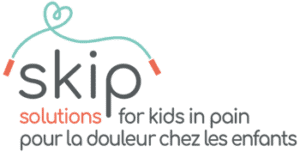Five pain researchers are participating in the PRF-ISPP 2023 Correspondents Program during the International Symposium on Pediatric Pain, taking place 1-4 October in Halifax, Nova Scotia. The Correspondents Program is a unique science communication training program that provides participants with the knowledge, skills, and best practices needed to communicate science effectively to a wide range of pain researchers, patients, and the greater public. The Correspondents will conduct interviews with pain professionals, write summaries of scientific lectures – and provide live blogging, too!
Take a look at their blog posts following the first two days of ISPP 2023, which consisted of Pain Education Day and Day 2 of the Scientific Program.
The PRF-ISPP Correspondents Program has been made possible through generous contributions from Solutions for Kids in Pain (SKIP) and the Centre for Pediatric Pain Research (CPPR).

![]()
ISPP Blog Posts
Beyond the Lens of Basic Science
ISPP’s Pain Education Day was also Treaty Day in Canada, and began with a keynote lecture from Jaris Swidrovich. Jaris shared with us the history and trauma of indigenous peoples from Canada which (as an Australian) provided some insightful context for what this day means to these communities.
When I first heard about Pain Education Day, I thought it was all about “pain education.” I work in Lorimer Moseley’s lab – and for those who don’t know him – he’s the “Explain Pain”/Pain Education guy, hence my bias in thinking that’s what the whole day was about. However, this year’s Pain Education Day focused on knowledge mobilization.
I must admit, during previous roles in my research career, knowledge mobilization and translation – or KT as I’d heard it referred to – wasn’t on my agenda. Much of my work at the time was “upstream’” of what was happening in the clinic, and I didn’t think KT was relevant. I was so wrong! Now, in my current program of research, it’s at the forefront of my mind, but feels like a bit of a black hole. This incredibly informative, interactive, and insightful day provided me with some great tips and resources to take home!
We heard from Christine Cassidy about knowledge mobilization and implementation science – which could have been overwhelming but was presented so elegantly and within the context of pediatric pain. She provided some wonderful frameworks that can be used to help understand implementation of “THE THING” (i.e., what we want to mobilize).
We also heard from a panel who shared some diverse approaches to knowledge mobilization that included: Katie Birnie (who chaired the world’s first national standard for pain management), Anna Wilson (who published the book When Children Feel Pain with journalist Rachel Rabkin Peachman), Samina Ali (who shared the knowledge mobilization network TREKK – Translating Emergency Knowledge for Kids), and Mats Eriksson (who shared their e-health application for clinicians and parents).
We also got to hear some critical perspectives on equity, diversity, inclusion, and accessibility in KT. To top things off, in the afternoon we got a chance to “get our hands dirty” and participate in a workshop where we used a knowledge mobilization planning tool for a set of given scenarios (how had I not heard of this before?!).
Thanks for launching #ISPP2023 with a bang!
Sarah Wallwork, PhD, is a research fellow in IIMPACT in Health at the University of South Australia. You can follow her on Twitter/X – @SarahBWallwork.
Pain Education Day at ISPP 2023 featured a crash course on knowledge mobilization and translation, but why is this so important? While research lays the foundation of knowledge, translating and mobilizing that knowledge is the key to effecting meaningful change in pediatric pain care.
Organizations like Solutions for Kids in Pain (SKIP) and Translating Emergency Knowledge for Kids are at the forefront of knowledge mobilization and translation in Canada. These groups offered lectures explaining the foundations of knowledge mobilization, and the day went on to highlight cutting-edge projects from around the world showcasing how knowledge mobilization is being used to improve the lives of those living with pain and their support networks. We also had the opportunity to participate in a hands-on workshop featuring @MelanieBarwick’s innovative knowledge translation tool to develop a strategy to move research evidence into medical practice and policy.
As I reflect on Pain Education Day, I realize that knowledge translation is a dynamic process and skill. It involves not only disseminating information but also engaging with the broader community and adapting research findings to the unique needs of patients. By fostering a culture of collaboration and emphasizing the translation of research into actionable practices, ISPP 2023 has made a significant contribution to advancing the field of pediatric pain care. The ripple effects today will undoubtedly extend far beyond the symposium and – optimistically – have a positive impact on the lives of young patients and their families worldwide.
Annemarie Dedek, PhD, is a postdoctoral fellow at Dalhousie University, Halifax, Nova Scotia. You can follow her on Twitter/X – @AnnemarieDedek.
By speaking to people with the lived experience of pain, I’ve learned it’s incredibly frustrating for them not to have a voice in implemented interventions. Thankfully, the attendees at ISPP 2023 have taken this frustration under consideration. They understand that multidisciplinary collaborations across interventions and research are essential, but how do we do it?

I’m grateful the amazing speakers at ISPP 2023 provided us with guidance on how to collaborate with those we seek to aid – talk to them.
As an example, one group learned that teenagers prefer their neuromuscular training to be done in groups so they can feel understood and heard. The opportunity to create meaningful social relationships with individuals who have a personal understanding of your disease is a way to feel less isolated.
Another example is the engagement of caregivers. Exploration of their own experiences and their motivation to participate in research has been a hot topic of conversation. Caregivers have a lot on their plate, which makes time a precious asset. To engage them in research and obtain their valuable insight, we must ensure that the goal of care aligns with that of caregivers.
So we have talked to healthcare professionals, users, and caregivers. What’s next? Compile that input to guide implementation of interventions. It is truly nonsense that actions toward patients and their support groups are implemented without the use of their opinions. I’m happy ISPP gets it.
Jéssica Ding is a master’s student at McGill University, Montreal, Canada. You can follow her on Twitter/X – @JessicadingJD.
Beyond the Lens of Basic Science
ISPP 2023 kicked off on 1 October with Pain Education Day, featuring different keynote speakers from institutions around the world discussing knowledge mobilization and translation. This was a topic that was brand new for me.
A fact that stuck out was that it takes ~17 years for ~14% of research to find its way into practice, and presents urgency for better knowledge translation and application (i.e., taking evidence “outside the box”). Although there exists evidence to practice gaps in the study of pain, we can’t deny there often exist gaps between clinicians and basic biomedical researchers like myself.
With this information fresh in my mind, we participated in an amazing workshop using a knowledge translation tool to help guide the development of knowledge transfer plans for our research. This challenged my existing perspectives and inspired me with novel ideas to implement a health standard for my work. It’s time to learn more about pain management and see pain beyond the lens of basic science.
Also – aside from the amazing quality of the presentations – ISPP’s organizational excellence, networking sessions, and outgoing attendees have been top notch. It’s great to collaborate with people who have a common goal – to better understand, manage, and treat pain. If we’re to be successful, it’s crucial to make pain better understood, visible, and meaningful.
Adewale Oluwaseun Fadaka, PhD, is a research fellow at the Cincinnati Children’s Hospital Medical Center, Ohio, USA. You can follow him on Twitter/X – @silvernonferous.
The second day of the Scientific Program at ISPP 2023 started with a plenary lecture about the impressive work of Susmita Kashikar-Zuck. What stuck out to me the most was how she approached the sports science department at the Cincinnati Children’s Hospital (Ohio, USA) to start a multidisciplinary research project.
Many times, we find ourselves looking for collaborations within our own “pond.” Her work is a great example of how we can be better together to create helpful and holistic interventions for kids in pain.
Another session that got me excited about international collaborations was the symposium on innovations in intensive interdisciplinary pain treatment, where promising approaches to improve chronic pain treatment from all over the world were presented. It can be hard to overcome the boundaries of what we’re used to and what we know we can do best.
To round out the day, Allison Smith opened my eyes with her talk about how we can help children accept change during therapy by preparing them beforehand. Sara Williams’ project was a great example of how much more effective an intervention (i.e., virtual reality) can be if different professions get involved. Also, Julia Wager’s talk encouraged us to think outside the box by supporting families for six months after discharge with social workers to augment the short time patients spend at the clinic.
While it can be challenging to find a common language when joining forces, these talks showed me that it really pays off when we acknowledge each other’s strengths and weaknesses to create something spectacular. So get out there, explore other disciplines, and get inspired!
Lisa-Marie Rau is a PhD candidate at the German Paediatric Pain Centre in Datteln, Germany. You can follow her on Twitter/X – @Lisa_Marie_Rau.


